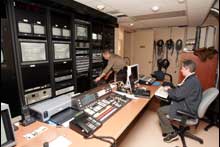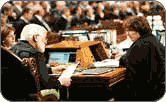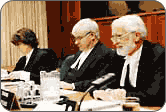
|
|

|
|

|
|||
 |
I. RESPONDING TO THE EVOLVING ROLE OF MEMBERS II. ENHANCING ONGOING SERVICES TO MEMBERS AND SUSTAINING THE INSTITUTION III. PROMOTING UNDERSTANDING AND SUPPORTING ADVANCEMENT OF LEGISLATIVE INSTITUTIONS IV. APPLYING THE HIGHEST STANDARDS OF PUBLIC-SECTOR GOVERNANCE IN A PARLIAMENTARY CONTEXT In Support of MembersThe Administrative Functions of the House of CommonsMembers of Parliament represent the public face of the House of Commons, working visibly on behalf of all Canadians. In their efforts, Members and their staff are supported by the House of Commons Administration. The House of Commons Administration is governed by the Board of Internal Economy. Chaired by the Speaker and made up of Members from all recognized political parties, the Board of Internal Economy is responsible for all matters of financial and administrative policy affecting the House of Commons. The House of Commons Administration itself consists of five service areas: Procedural Services; the Office of Law Clerk and Parliamentary Counsel; Information Services; Parliamentary Precinct Services; and Corporate Services. These service areas, which draw on the equivalent of approximately 1,685 full-time employees, are accountable to the Clerk of the House of Commons, who serves as Secretary to the Board of Internal Economy and reports to the Speaker.
Strategic
Objectives
These objectives -undertaken with the approval of the Board of Internal Economy and the Speaker- guided the initiatives undertaken or advanced in 2004-2005. Key results achieved and commitments made are outlined in the sections that follow. |
 
|
|||||
I. Responding to the evolving role of MembersIn recent years, all political parties represented in the House of Commons have expressed the need for parliamentary reform. As Members adopt new ways of conducting House of Commons business, engaging constituents and bringing Parliament closer to Canadians, their role continues to evolve -and so do the tools and technologies Members use to carry out that role. The House of Commons Administration helps the country's elected representatives achieve their stated objectives by presenting options, by providing procedural advice and guidance, and by ensuring that Members have access to parliamentary information via a flexible, advanced technology infrastructure. Supporting the evolution of parliamentary practices and rules. The evolving role of Members is paralleled by an evolution of parliamentary practices and rules. The House of Commons Administration conducts research and provides procedural options and advice to Members in relation to these changes. In 2004-2005, changes to the Standing Orders were drafted and procedural staff worked with Members on a review of the rules governing Private Members' business. Ensuring a flexible technology infrastructure. Canada is a geographically vast country, and many Members' ridings extend across great distances. Information and communications technologies deliver essential connectivity to Members' constituency offices and throughout the parliamentary precinct-providing greater access to information and enabling more immediate contact with Canadians. The House of Commons Administration provides the services and equipment Members need to carry out their work-wherever they are. In 2004-2005, mobile devices were made available to Members and technology was upgraded to provide them with network access from their seats in the Chamber. Improving Members' access to parliamentary information. Development will continue on the project "Today in the House" that aims to provide a central access point on the Web to any information required to follow House activities on a given sitting day. Ultimately, through links to and between daily publications, Members, staff and the public will be able to access information about events that have occurred or are projected to occur during the day, as well as background information on bills and procedural reference material. |
Photo: © HOUSE OF COMMONS
|
||||||
|
To prepare effectively for the variety of Chamber proceedings, Members must be notified of upcoming business. Normally, items are listed in a Notice Paper for at least 48 hours before they can be dealt with by the House of Commons. Providing notice has traditionally required a paper copy signed by the Member and delivered to House officials. Recently, the House of Commons Administration developed an online notice-filing system, which allows notice to be given more efficiently -and virtually instantly- from Members' offices or from anywhere they have Internet access. II. Enhancing ongoing services to Members and sustaining the institutionThe House of Commons Administration serves each new set of elected representatives, but it also devotes resources to sustaining the institution over time. Upgrading support systems and improving basic services helps ensure that Members' business requirements are met both today and in the future, and that the public is provided with safe and sufficient access to this national institution. Activities related to fulfilling these goals range from ensuring election readiness to establishing business continuity plans that deal with possible emergencies. Ensuring election readiness. The House of Commons Administration must ensure a smooth transition from one Parliament to the next by providing information and services to new, returning and departing Members. This support was provided in 2004, both prior to and following the general election held that June. The Administration will ensure that lessons learned in 2004 inform the development of future preparations. |
PHOTO: © HOUSE OF
COMMONS |
||||||
|
Renovating the Parliament buildings.
The heritage buildings in which Members run their
offices and conduct their work were designed for fewer
elected representatives who relied on pen and paper
rather than mouse and modem. Adapting original
structures to accommodate more people and new
technological equipment continued throughout The House of Commons collaborated with Public Works and Government Services Canada to adapt its plans and activities in response to changing government priorities, which affected plans for the construction of a new building for committee rooms and parliamentarians' offices. Renovations to the West Block were identified as a priority, and planning for the temporary relocation of Members, staff and services began. Improving information-technology services. By taking advantage of the House of Commons Administration's information technology services, and its growing online resources, Members are able to conduct business more rapidly and communicate more effectively with constituents and other parliamentarians. In 2004-2005, video-conferencing capabilities were enhanced and audio systems were upgraded in committee rooms. An online IT Service Desk was established to extend to Members and their staff round-the-clock access to technology support. A revised, comprehensive Members' Allowances and Services manual, previously available in print only, was also launched in an online format. A new purchasing system to be completed in 2005-2006 will provide Members with unprecedented efficiency, making it possible to buy office furniture, equipment and supplies online. Refining the business continuity and resumption plan for the House of Commons. The House of Commons Administration evaluates threats and risks on a continual basis and implements strategies in response to them. In 2004-2005, as part of a broad effort to develop a plan to ensure the continuation of Parliament in case of emergency, it identified accommodation requirements, planned for the resumption of activity in emergency situations, and conducted simulations to assess, adjust and standardize emergency-response capabilities. Planning, design and implementation of information-technology requirements will continue in 2005-2006 to ensure that Members, committee rooms and parliamentary staff can be relocated in case of an emergency. |
PHOTO: © HOUSE OF
COMMONS |
||||||
III. Promoting understanding and supporting advancement of legislative institutionsThrough a variety of outreach services and activities, the House of Commons Administration supports the work of Members by promoting understanding of Canada's parliamentary institutions and facilitating participation in parliamentary proceedings. It also helps them share best practices with counterparts at home and abroad, and support the development of existing and emerging legislative institutions. Updating major publications on parliamentary procedure. In an effort to better communicate the history, traditions and practices of the House of Commons, efforts were made in 2004-2005 to revise core procedural publications and make them more readily available to Members, parliamentary staff, and the public. The first edition of House of Commons Procedure and Practice-also known as Marleau-Montpetit, after its authors-will be made available to the public on the Parliament of Canada Web site in 2005-2006. The online version will provide convenient, searchable access to this essential procedural reference work. Work on the second edition of the Annotated Standing Orders continued, with the aim of producing a complete revised edition for release in 2005-2006. This important reference work provides commentary and a historical summary for each of the Standing Orders -the written rules of the House of Commons. The House of Commons Administration will also launch a new online reference in 2005-2006 the Compendium of Parliamentary Procedure. Designed for the Web, this document will provide both general and detailed explanations of how the House of Commons and its committees function. Providing learning opportunities for parliamentarians and legislative officials from jurisdictions in Canada and abroad. In 2004-2005, the House of Commons Administration provided ongoing organizational support for a range of international and interparliamentary activities, and began or continued preparations for several upcoming conferences, exchanges and events. Preparations also begun to host the annual professional-development seminar for the Canadian Association of Clerks-at-the-Table in August 2005. In November 2004, the Law Clerks of the House of Commons and the Senate, in partnership with the Canadian Bar Association, co-hosted a Law and Parliament conference to help Members deepen their understanding of the role that law plays in relation to political practices and policy rules. The conference included four panels of academics, current and past parliamentarians, as well as specialists in public law. It drew an enthusiastic audience of 175 -including parliamentarians and their staff, Bar members, law students, and employees of the House of Commons, the Senate and Library of Parliament. In the fall of 2005, a third Parliamentary Officers' Study Program will be added to the usual two sessions held each year. The House of Commons Administration, with its partners the Senate and Library of Parliament, will host participants from the legislatures of Brazil and the Spanish-speaking countries of the Inter-Parliamentary Forum of the Americas. This program will enable participants to learn about the functioning of Canada's Parliament and reflect on their own practices. Sharing Parliament's heritage with Canadians. The House of Commons Administration has a responsibility to preserve and share the history of Parliament with Canadians. Work continued in 2004-2005 on a Heritage Collection Web site that will provide detailed information on most heritage items within the Parliamentary precinct. In 2005-2006, the site will be launched publicly. In addition, advance planning and consultation with key partners was undertaken for development of aninteractive Memorial Chamber Web site, which schools may find useful for raising students' awareness of Canada's history in conflicts at home and overseas. The Memorial Chamber, a central component of the Peace Tower on Parliament Hill, is dedicated to men and women who have given their lives in the service of Canada. |
Up-to-date resources and research material were made available this year to parliamentarians and the public both in print and online, including: |
||||||
IV. Applying the highest standards of public-sector governance in a parliamentary contextThe House of Commons Administration is committed to ensuring its accountability and transparency to Canadians by developing and adopting best practices, and by promoting the effective management and responsible stewardship of its resources. Keeping the House of Commons secure. The House of Commons Administration carried out several activities in 2004-2005 to maintain security while meeting Canadians' expectations for an open and accessible Parliament. Work continued on assessing threats and risks to the House of Commons-an important step toward guiding long-term renovation, business continuity and security plans. Particular focus was centred on strengthening partnerships with Senate Protective Services and the Royal Canadian Mounted Police. Strengthening House of Commons management practices. The House of Commons Administration is committed to being both diligent and accountable in the management of its resources. In 2004-2005, policy development and revision activities were undertaken in the areas of staffing, official languages and hospitality -in 2005-2006, activities will focus on conflict of interest, the management of capital assets based on a lifecycle plan, and health and safety. Risk-based review activities in 2004-2005 included an examination of the administration's compliance with its travel and hospitality policies, a preliminary assessment of its human resources function, and a third-party audit of its 2003-2004 Financial Statements. In 2005-2006, the Administration will complete a review of its contracting policy and procedures. The ongoing development of risk management frameworks and tools will also support the effective delivery of services to Members. Managing parliamentary information. New methods for managing parliamentary information were developed in 2004-2005, ensuring that the collective knowledge of the House of Commons is preserved for Members and accessible whenever needed. This work was guided by a long-term vision and strategy that will minimize duplication of effort and strengthen the collaborative delivery of information services by the Senate, the House, the Library of Parliament, and Public Works and Government Services Canada's Translation Bureau. A new Legislative Information Management Application was developed in 2004-2005 to better support requests for Private Members' bills. Work continued, as well, on a comprehensive information management system that will improve the accessibility and accuracy of legal information. Sustaining a motivated and effective workforce. The House of Commons Administration is one of countless organizations in Canada preparing for an anticipated wave of retirement brought on by the aging of the Baby Boomer generation. Acting responsibly to preserve its corporate knowledge and ensure a successful transition to the next generation of staff at all levels, the Administration continued succession planning activities in 2004-2005. |
PHOTO: © HOUSE OF
COMMONS |
||||||
|
The House of Commons Administration has approved a revised staffing policy that will sustain modern human-resource management practices by emphasizing key management principles such as competency, transparency and accountability. To support its recruitment efforts, as well as to identify employee learning and development needs, facilitate discussions on job performance, and help employees plan and manage their careers, the Administration has developed -and continues to develop- competency profiles identifying the knowledge, skills and qualities required by employees at almost all levels and in all service areas of the organization. Improving environmental management on the Hill. To continue its leadership role with regard to the environment, in 2004-2005, the House of Commons Administration launched a comprehensive Web site for the Partners for a Green Hill program, which outlines environmental priorities and practices shared among the Senate, the House of Commons, the Library of Parliament and Public Works and Government Services Canada. To reflect this broad partnership, a redesigned environmental awards program was developed for initiation in April 2005. Other environmental activities in 2004-2005 ranged from the launch of a paper-towel composting initiative to development of a comprehensive program on the transportation of dangerous goods. |
Photo: © HOUSE OF COMMONS /
janet brooks |
||||||




